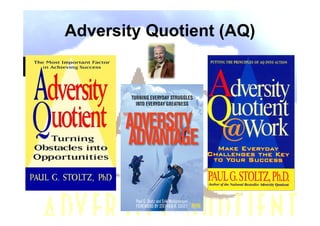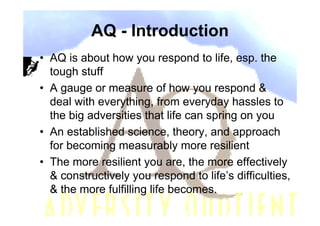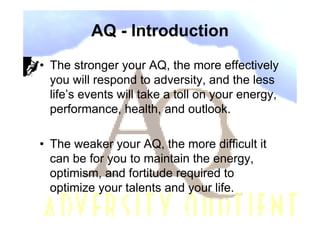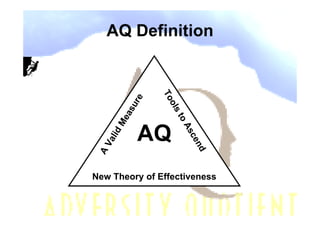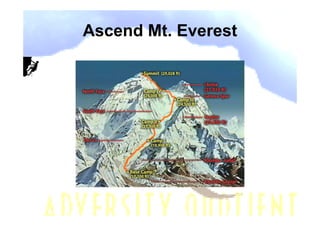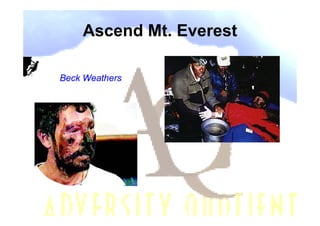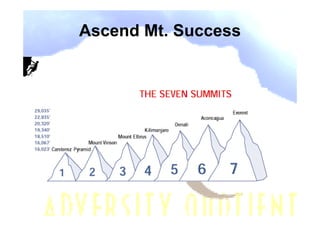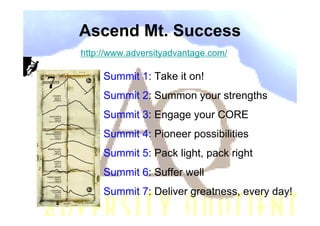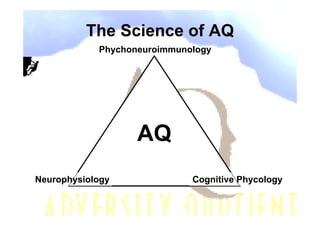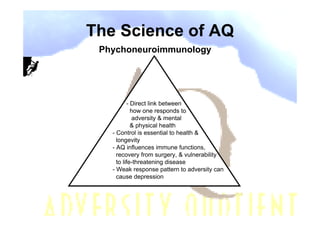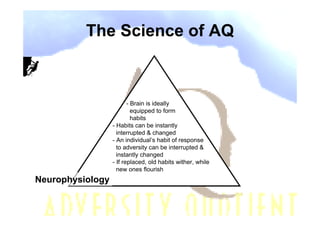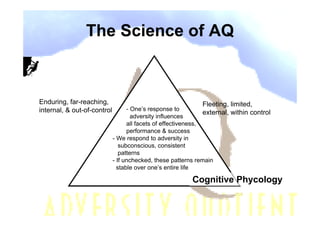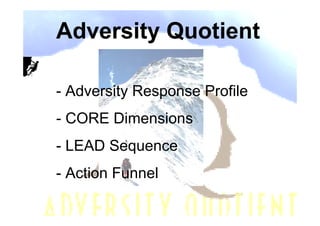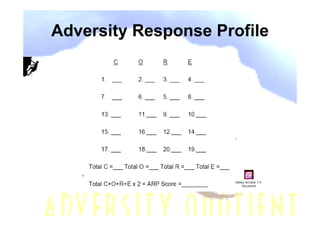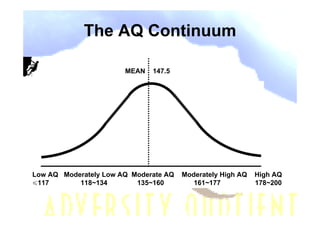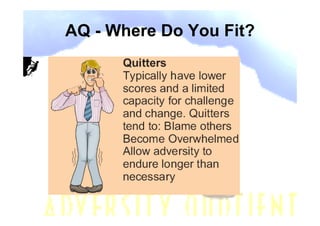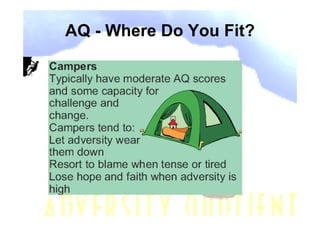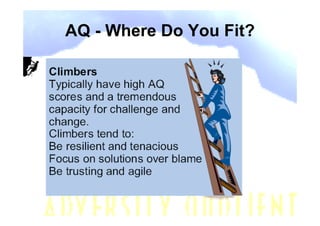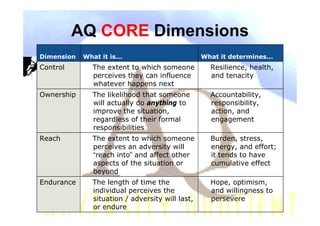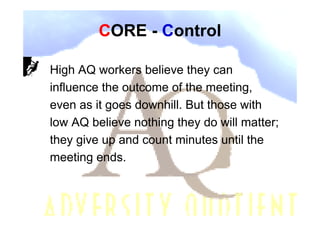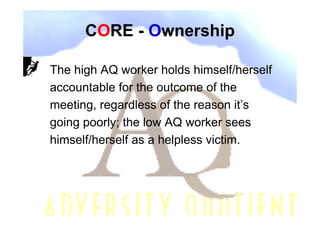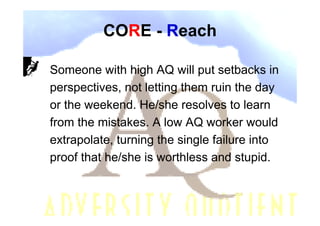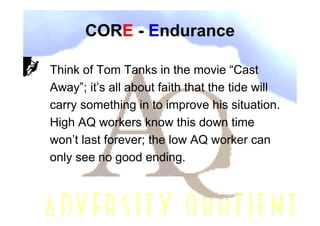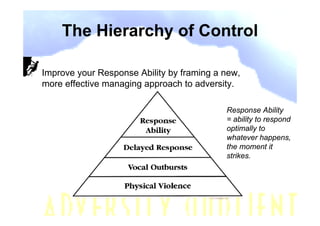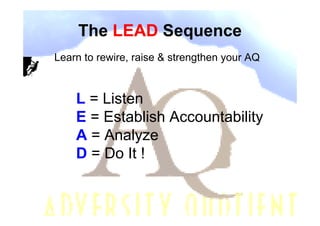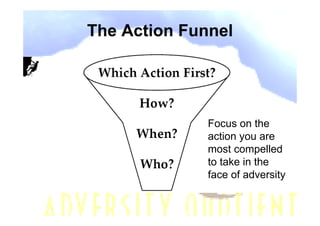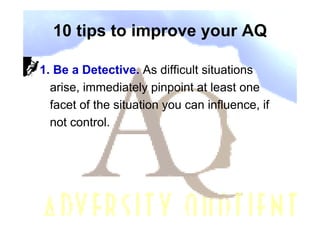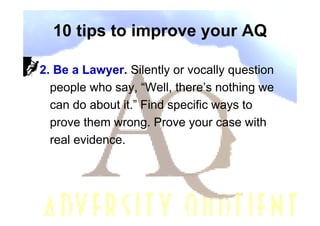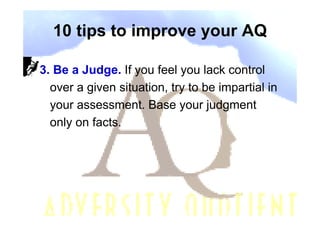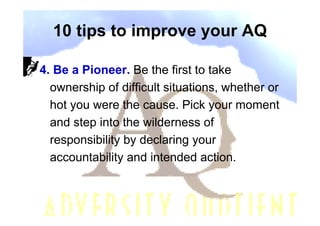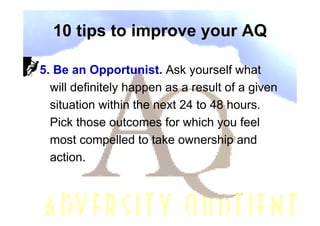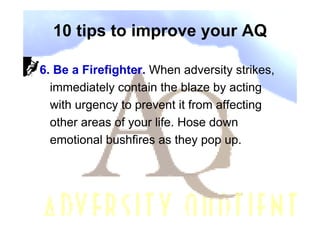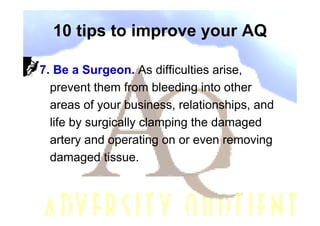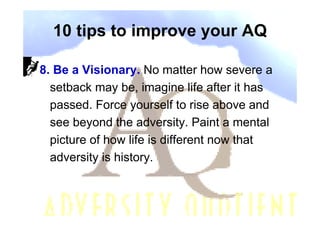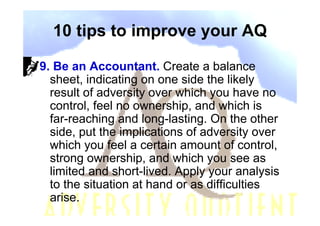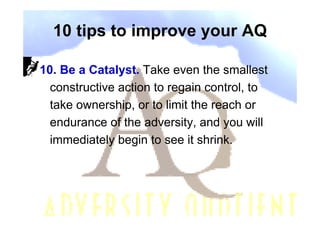Adversity Quotient
- 1. 剃斌 Adversity Quotient ELP Facilitator Meeting (Shanghai) 15~16th Sep, 2011 BabHui Lee
- 3. AQ - Introduction ? AQ is about how you respond to life, esp. the tough stuff ? A gauge or measure of how you respond & deal with everything, from everyday hassles to the big adversities that life can spring on you ? An established science, theory, and approach for becoming measurably more resilient ? The more resilient you are, the more effectively & constructively you respond to life¨s difficulties, & the more fulfilling life becomes.
- 4. AQ - Introduction ? The stronger your AQ, the more effectively you will respond to adversity, and the less life¨s events will take a toll on your energy, performance, health, and outlook. ? The weaker your AQ, the more difficult it can be for you to maintain the energy, optimism, and fortitude required to optimize your talents and your life.
- 5. AQ Definition To e ur ols as to Me As AQ lid ce Va nd A New Theory of Effectiveness
- 7. Ascend Mt. Everest Beck Weathers
- 9. Ascend Mt. Success http://www.adversityadvantage.com/ Summit 1: Take it on! Summit 2: Summon your strengths Summit 3: Engage your CORE Summit 4: Pioneer possibilities Summit 5: Pack light, pack right Summit 6: Suffer well Summit 7: Deliver greatness, every day!
- 10. The Science of AQ Phychoneuroimmunology AQ Neurophysiology Cognitive Phycology
- 11. The Science of AQ Phychoneuroimmunology - Direct link between how one responds to adversity & mental & physical health - Control is essential to health & longevity - AQ influences immune functions, recovery from surgery, & vulnerability to life-threatening disease - Weak response pattern to adversity can cause depression
- 12. The Science of AQ - Brain is ideally equipped to form habits - Habits can be instantly interrupted & changed - An individual¨s habit of response to adversity can be interrupted & instantly changed - If replaced, old habits wither, while new ones flourish Neurophysiology
- 13. The Science of AQ Enduring, far-reaching, Fleeting, limited, internal, & out-of-control - One¨s response to external, within control adversity influences all facets of effectiveness, performance & success - We respond to adversity in subconscious, consistent patterns - If unchecked, these patterns remain stable over one¨s entire life Cognitive Phycology
- 14. Adversity Quotient - Adversity Response Profile - CORE Dimensions - LEAD Sequence - Action Funnel
- 15. Adversity Response Profile Adobe Acrobat 7.0 Document
- 16. The AQ Continuum MEAN 147.5 Low AQ Moderately Low AQ Moderate AQ Moderately High AQ High AQ +117 118~134 135~160 161~177 178~200
- 17. AQ - Where Do You Fit?
- 18. AQ - Where Do You Fit?
- 19. AQ - Where Do You Fit?
- 20. AQ CORE Dimensions Dimension What it is... What it determines... Control The extent to which someone Resilience, health, perceives they can influence and tenacity whatever happens next Ownership The likelihood that someone Accountability, will actually do anything to responsibility, improve the situation, action, and regardless of their formal engagement responsibilities Reach The extent to which someone Burden, stress, perceives an adversity will energy, and effort; ^reach into ̄ and affect other it tends to have aspects of the situation or cumulative effect beyond Endurance The length of time the Hope, optimism, individual perceives the and willingness to situation / adversity will last, persevere or endure
- 21. CORE - Control High AQ workers believe they can influence the outcome of the meeting, even as it goes downhill. But those with low AQ believe nothing they do will matter; they give up and count minutes until the meeting ends.
- 22. CORE - Ownership The high AQ worker holds himself/herself accountable for the outcome of the meeting, regardless of the reason it¨s going poorly; the low AQ worker sees himself/herself as a helpless victim.
- 23. CORE - Reach Someone with high AQ will put setbacks in perspectives, not letting them ruin the day or the weekend. He/she resolves to learn from the mistakes. A low AQ worker would extrapolate, turning the single failure into proof that he/she is worthless and stupid.
- 24. CORE - Endurance Think of Tom Tanks in the movie ^Cast Away ̄; it¨s all about faith that the tide will carry something in to improve his situation. High AQ workers know this down time won¨t last forever; the low AQ worker can only see no good ending.
- 25. The Hierarchy of Control Improve your Response Ability by framing a new, more effective managing approach to adversity. Response Ability = ability to respond optimally to whatever happens, the moment it strikes.
- 26. The LEAD Sequence Learn to rewire, raise & strengthen your AQ L = Listen E = Establish Accountability A = Analyze D = Do It !
- 27. The Action Funnel Focus on the action you are most compelled to take in the face of adversity
- 28. Adversity Quotient - 10 tips to improve your AQ
- 29. 10 tips to improve your AQ 1. Be a Detective. As difficult situations arise, immediately pinpoint at least one facet of the situation you can influence, if not control.
- 30. 10 tips to improve your AQ 2. Be a Lawyer. Silently or vocally question people who say, ^Well, there¨s nothing we can do about it. ̄ Find specific ways to prove them wrong. Prove your case with real evidence.
- 31. 10 tips to improve your AQ 3. Be a Judge. If you feel you lack control over a given situation, try to be impartial in your assessment. Base your judgment only on facts.
- 32. 10 tips to improve your AQ 4. Be a Pioneer. Be the first to take ownership of difficult situations, whether or hot you were the cause. Pick your moment and step into the wilderness of responsibility by declaring your accountability and intended action.
- 33. 10 tips to improve your AQ 5. Be an Opportunist. Ask yourself what will definitely happen as a result of a given situation within the next 24 to 48 hours. Pick those outcomes for which you feel most compelled to take ownership and action.
- 34. 10 tips to improve your AQ 6. Be a Firefighter. When adversity strikes, immediately contain the blaze by acting with urgency to prevent it from affecting other areas of your life. Hose down emotional bushfires as they pop up.
- 35. 10 tips to improve your AQ 7. Be a Surgeon. As difficulties arise, prevent them from bleeding into other areas of your business, relationships, and life by surgically clamping the damaged artery and operating on or even removing damaged tissue.
- 36. 10 tips to improve your AQ 8. Be a Visionary. No matter how severe a setback may be, imagine life after it has passed. Force yourself to rise above and see beyond the adversity. Paint a mental picture of how life is different now that adversity is history.
- 37. 10 tips to improve your AQ 9. Be an Accountant. Create a balance sheet, indicating on one side the likely result of adversity over which you have no control, feel no ownership, and which is far-reaching and long-lasting. On the other side, put the implications of adversity over which you feel a certain amount of control, strong ownership, and which you see as limited and short-lived. Apply your analysis to the situation at hand or as difficulties arise.
- 38. 10 tips to improve your AQ 10. Be a Catalyst. Take even the smallest constructive action to regain control, to take ownership, or to limit the reach or endurance of the adversity, and you will immediately begin to see it shrink.

